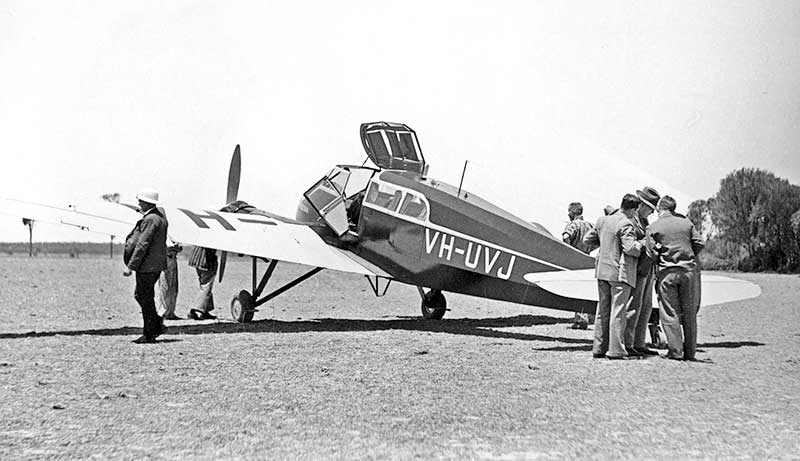
Airlines (WA) Ltd GAL ST25 Monospar VH-UVJ "Miss Wiluna" at Dalwallinu WA on 2 December 1935 during the
newly-formed company's inaugural air service from Perth to the WA goldfields. Geoff Goodall collection
Now
little remembered, the General Aircraft Ltd Monospars played an important role during the
1930s growth period of Australia's airlines, allowing new air mail
routes to be developed where paying passengers would be few. The
Monospars economically carried 3 to 5 passengers with power provided by two
90hp Pobjoy Niagaras or 130hp De Havilland Gipy Majors depending on
model. newly-formed company's inaugural air service from Perth to the WA goldfields. Geoff Goodall collection
The name Monospar came from the single cantilever metal wing spar which was quite revolutionary in the British biplane era.
General Aircraft Ltd was formed in 1931 at Croydon Aerodrome, London to produce a series of commercial aeroplanes based on the patented wing spar designed by Swiss aeronautical engineer H.J.Stieger. He was chief designer for the new company hence the "ST-" prefix to the various GAL Monospar models. After producing models ST-4 to ST-9, General Aircraft Ltd was reorganised financially and moved during 1935 to better equipped factory premises at Hanworth Air Park near London.
The next model was the ST-10 which was structurally similar but included many improvements and an enhanced performance. The prototype ST-10 winning the 1934 Kings Cup Air Race with the designer riding as passenger attracted favourable interest and GAL marketed variants with retractable undercarriage and DH Gipsy Majors. The final type was the ST-25 Jubilee with a folding seat for a 5th passenger and an extra rear cabin window, which continued in production until 1939 by which time 59 had been built including the ST-25 Universal with twin rudder tail unit. The standard ST-25 factory paint scheme was gloss black wth yellow trim. After WWII General Aircraft Ltd merged with Blackburn Aircraft.
Monospar construction numbers(c/n) run sequentially, prefixed by the model.
The following GAL Monospar models were operated in Australia:
ST-10 Pobjoy Niagara I engines (90hp)
ST-11 ST-10 with retractable undercarriage
ST-12 ST-10 with DH Gipsy Major engines (130hp)
ST-25 Improved ST-10 with Pobjoy Niagara II engines (90hp), radio and instrument homing as standard, extra rear windows
An order was promptly placed for three Monospar ST.12s VH-UTH Captain Cook, VH-UTK Captain Phillip and VH-UTM Captain Flinders.
But British Pacific Trust and New England Airways Managing Director G.A.Robinson had bigger plans, forming a new company Oceanic Airways Ltd, Sydney to operate between Australia and New Zealand across the Tasman Sea. A larger ten passenger Monospar design then on the drawing board at GAL was selected to launch the new international route. Aeroplane magazine reported in its 30 January 1935 issue:
"The building of a new twin-motored low wing monoplane for ten passengers and two crew by General Aircraft Ltd has been announced. According to a statement issued by the company, the new machine, the ST.18 will have a speed of 208 mph. Range will be 600 miles according to calculation. It will have retractable undercarriage, variable pitch airscrews and wing flaps. It is claimed the ST.18 will climb with full load on one engine. A number of these machines will be built for Oceanic Airways Ltd in Australia, of which the Rt. Hon. W.T.Hughes is Chairman."
On 31 January 1935 a joint statement was issued in London by H.C.Armstrong and G.A.Robinson stating that five Monospar ST.18s had been ordered for Oceanic Airways Ltd. However the Australian Government indicated it was likely to reject a Tasman air service as too hazardous plus delays building the ST.18, the Oceanic Airways order was quietly cancelled and the company wound up. By the time the prototype ST.18 G-AECB made an Australian promotional tour in August that year there a no mention in the press of an Australian order.
Meanwhile New England Airways commenced a new scheduled route Brisbane-Townsvile on 16 June 1935 with Avro Tens and the Monospar ST.12s, extending to Cairns from October 1935. During October 1935 New England Airways was restructured with a new name Airlines of Australia Ltd, Sydney, importing four Stinson A trimotors and placing orders for new Douglas DC-2s. The Australian airline scene was now defined by two major players, Australian National Airways operating from Sydney south and west, and Airlines of Australia from Sydney north to Brisbane and Cairns. ANA purchased a major shareholding in Airlines of Australia in 1937 leading to an agreement for the two airlines to operate in conjunction until ANA finally took over AofA effective 1July 1942.
Only one Australian Monospar continued flying after World War II, VH-UTH. It went on to an active life as a twin-engined training aircraft then touring with private owners, before an adventurous flight to England in 1961. It lives on in a British aviation museum.
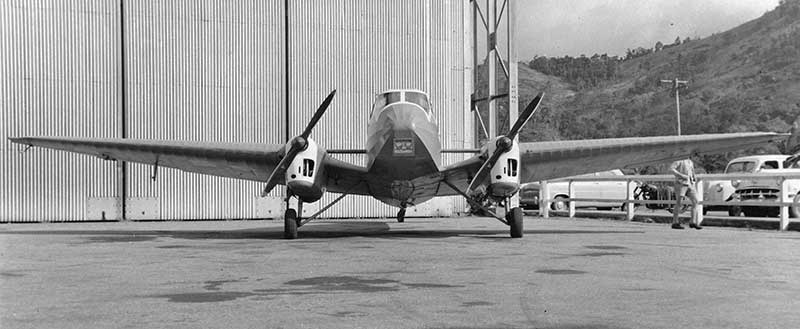
Maurice Austin collection
| .34 | Built by General Aircraft Ltd at Croydon
as prototype ST.11, which was the ST-10 model fitted with retractable
undercarriage. 2 x Pobjoy Niagara 1 engines with 4 bladed propellers |
| Ordered by Civil Aviation Branch, Department of Defence, Melbourne Victoria Australia | |
| CAB reserved the G-AUA_ series (VH-UA_ after 1929) for its own aircraft | |
| Painted in factory as VH-UAZ, all silver finish | |
| 17.8.34 | First flight Croydon by GAL test pilot Flight Lieutenant H.M.Schofield |
| 8.34 | Flight tests being carried out at Croydon |
| 4.9.34 | Final flight test at Croydon. Dismantled and boxed for shipping to Australia |
| 15.10.34 | Arrived Port Mebourne as cargo on board the liner Moreton Bay |
| 20.10.34 | Received by CAB at Essendon Aerodrome, Melbourne, assembly commenced |
| 24.10.34 | First flight Essendon after assembly, CAB pilot David Ross |
| 29.10.34 | Added to Civil Register VH-UAZ Civil Aviation Branch, Department of Defence, Melbourne Vic |
| 29.10.34 | Australian CofA issued |
| Operated
extensively across Australia transporting CAB officers, also used in
searches for missing aircraft. Carried the Governor General on occasions. | |
| Experienced pilot Arthur H. Affleck joined the CAB in 1936 as a pilot examiner. In his book "The Wandering Years" he wrote: "I also did trips further afield in our Monospar ST.11, an aeroplane which was equipped with two Pobjoy engines. These were so small in size that any mechanic who was licenced to work on Pobjoys was popularly supposed to to have served an apprentership as a watchmaker. In this aircraft I went as far north as Cairns and as far west as Perth. I also spent many weeks flying on airline routes throughout Australia and inspecting the services operating over them." | |
| 23.9.35 | Arrived at Perth-Maylands WA from Melbourne for a two day stay. |
| 4.10.35 | Took part in aerial search for missing Holyman's Airways DH.86 VH-URT Loila over Bass Strait between Tasmania and Melbourne, continued for two weeks. |
| 7.4.36 | Change to owner's name: Civil Aviation Board, Department of Defence, Melbourne |
| 16.12.36 | Accompanied the 3 day Brisbane-Adelaide Air Race, CAB pilot Dave Ross. Returned to Essendon 21.12.36 |
| 30.1.37 | Undercarriage collapsed on takeoff Brisbane-Archerfield Qld causing serious damage |
| 5.10.37 | Test flown Archerfield after repair by Qantas Empire Airways, flew to Essendon same day |
| 14.11.38 | Change to owner's name: Department of Civil Aviation, Melbourne Vic |
| 19.2.39 | Last flight for DCA, Essendon-Sydney-Essendon. Retired at Essendon, total airframe time 617 hours. Replaced by new Percival Q6 VH-ABY |
| Stored in hangar Essendon pending decision on its disposal | |
| 12.40 | Government Contract Board accepted a low bid of £150 from Keith Farmer with the comment
"Mr. Farmer has done an exceedingly good job for aviation without
any tangible recognition and it is considered that the best interests
of aviation would be served if this aircraft were transferred to his
ownership." |
| 15.2.41 | Change of ownership: Keith R.M. Farmer, Melbourne Vic Keith Farmer was a WWI fighter pilot who on his return to Australia gained Australian civil pilot licence No.13 before going on to a long civil aviation career, mostly joyriding. By the late 1930s he was known at Essendon as "The King of the Joyriders" flying his Sopwith Gnu VH-UBY re-engined with 220hp Wright Cyclone, and DH.50 VH-UAB with a 220hp Puma, carring 3 and 5 passengers respectively. |
| 30.3.41 | Test flown Essendon by Farmer, aircraft's first flight since 19.2.39 |
| Based Coode Island Aerodrome, Melbourne flown by Keith Farmer on charter and joy rides. | |
| 1.6.41 | Minor
damage in collision with RAAF Tiger Moth R5260 at No.3 Elementary
Flying Training School, Essendon. Tiger Moth had damage to tailplane,
repaired within 3 days |
| 15.2.42 | Last flight with Farmer, retired due wartime petrol rationing. Total airframe time 676 hours |
| 5.42 | Sold
to Airlines (WA) Ltd, Perth as a temporary replacement for their
Stinson Reliant VH-UTW which had been destroyed by a Japanese air raid
on Broome WA 20.3.42. Monospar's CofA renewal overhaul
carried out by engineer Harry
Moss and spray painted in camouflage as per DCA wartime regulations for
civil aircraft. |
| 29.5.42 | Change of ownership: Airlines (WA) Ltd, Perth WA |
| 31.5.42 | Ferried Melbourne-Perth in one day by company Managing Director Captain Charles Snook, flying time 21 hrs 30 mins |
| 3.6.42 | Entered service with Airlines (WA) Ltd on their Perth-Wiluna-Kalgoorlie route |
| 24.11.42 | Undercarriage damaged during forced landing at Rockwell while en route Cue-Perth. Ferried to Maylands Aerodrome, Perth the following day for repairs |
| 15.1.43 | Test flown Maylands after repair. Returned to airline service. |
| 10.3.43 | Last flight before annual CofA renewal overhaul at Maylands which required a complete strip down. |
| 8.9.43 | Test flown Maylands, CofA renewed. Camouflage removed, sprayed all silver. |
| 16.6.44 | Damaged
in forced landing Maylands. Port engine failed immediately after
takeoff on scheduled flight No.52A to Norseman. Port landing gear
collapsed during landing run in a paddock adjacent to the aerodrome
boundary, aircraft ground-looped. Pilot Glyn Smith not hurt, no
passengers. Investigation found that pilot mismangement of fuel selectors had cut fuel to the port engine. |
| 28.8.44 | Test flown Maylands after repair. Returned to airline services |
| 8.45 | Airlines (WA) Ltd report : VH-UAZ is now doing relatively little flying |
| 6.10.45 | Last flight: Perth-Norseman-Esperance-Perth. Retired on arrival back at Maylands Aerodrome. Total airframe time: 1,201 hours |
| 5.46 | Stored dismantled in hangar at Maylands |
| 7.46 | Airlines
(WA) Ltd letter to DCA: VH-UAZ is being slowly overhauled for renewal
of CofA on an as-time-permits basis and intend to replace the Pobjoy
Niagara engines with DH Gipsy Majors.The undercarriage needs replacing
and they are considering fitting the fixed undercarriage from their
retired DH.90 Dragonfly VH-ADG. |
| 47 | VH-UAZ
overhaul discontinued. Moved by road from Maylands to the new Airlines
(WA) Ltd base at nearby Guildford Aerodrome (now Perth Airport) |
| 19.12.47 | Struck off Civil Register |
| c48 | The dismantled airframe was sold to a scrap dealer. Before being collected it was acquired by Airlines(WA) Ltd engineer Allan Boothey, 19 Kanowna Avenue, Redcliffe, Perth |
| Boothey
moved the dismanted Monospar to his home at Redcliffe. It was unloaded
in his back garden, a mostly complete airframe except for
undercarriage. | |
| Boothey sold the two Pobjoy Niagara engines to Keith Farmer, Melbourne | |
| Airframe left to deteriorate in open weather, Boothey planned to use it as a chicken house. | |
| c51 | Destroyed by grass fire that started in a vacant block adjoining the house. |
| 8.72 | Burnt metal framework of VH-UAZ still in the back yard at 19 Kanowna Avenue |
| 72 | Remains collected by Air Force Association Aviation Museum Group,
and placed in storage at AFA Estate, Bull Creek, Perth. The group was
the embryo of the Aviation Heritage Museum later built at the Bull
Creek site. |
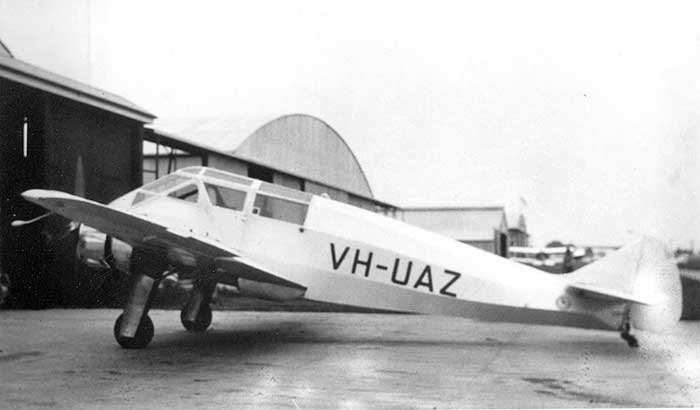
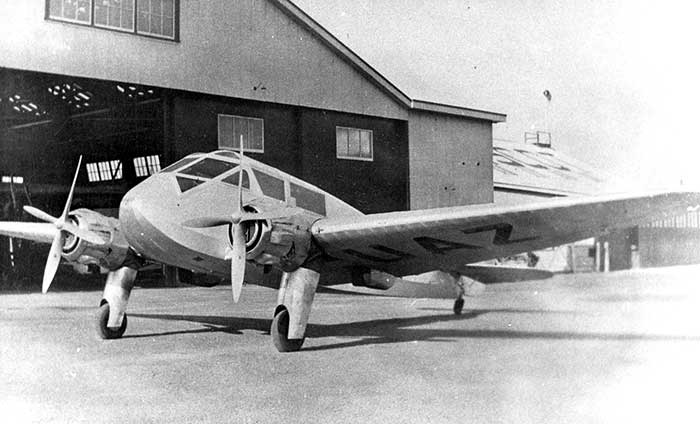
Geoff Goodall collection
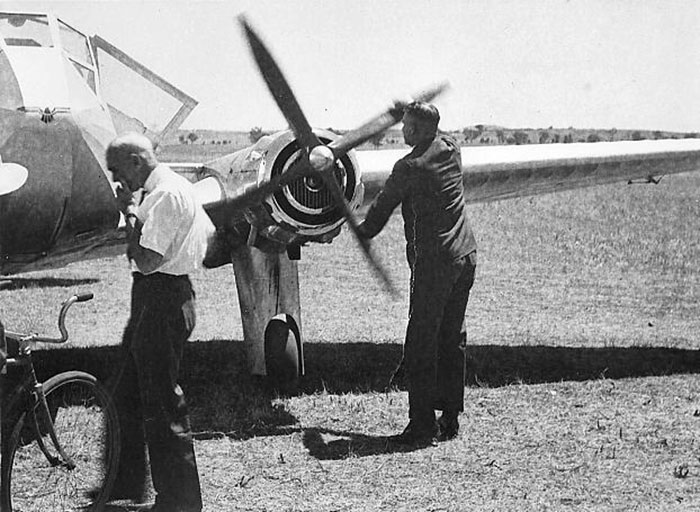
Civil Aviation Historical Society
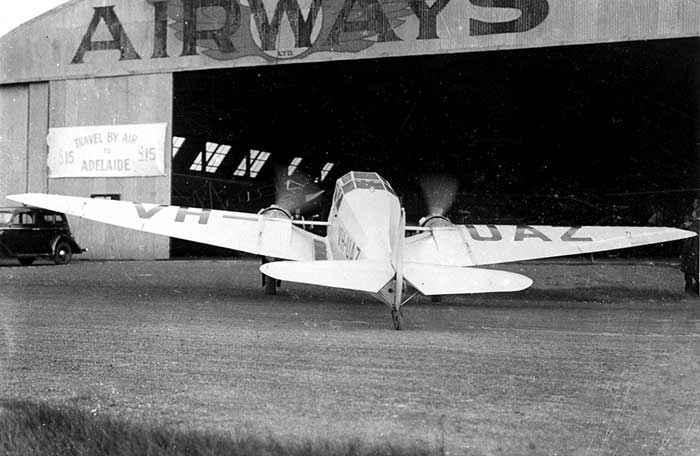
It is at the West Australian Airways hangar with signs advertising their Adelaide service for £15 per seat.
Geoff Goodall collection
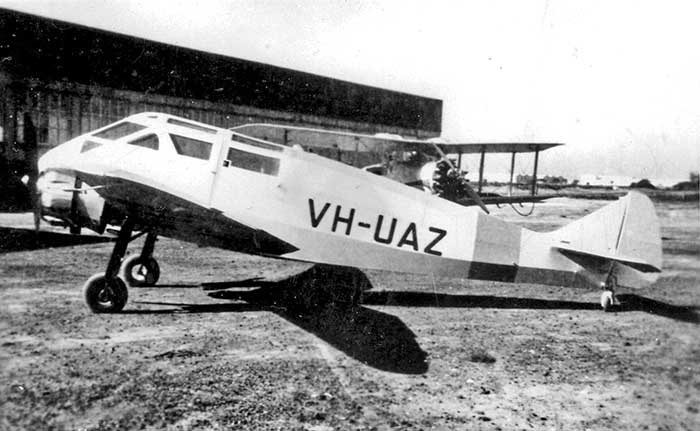
The Monospar's undercarriage fairings have been removed and it is now fitted with a 2 bladed propeller.
Geoff Goodall collection
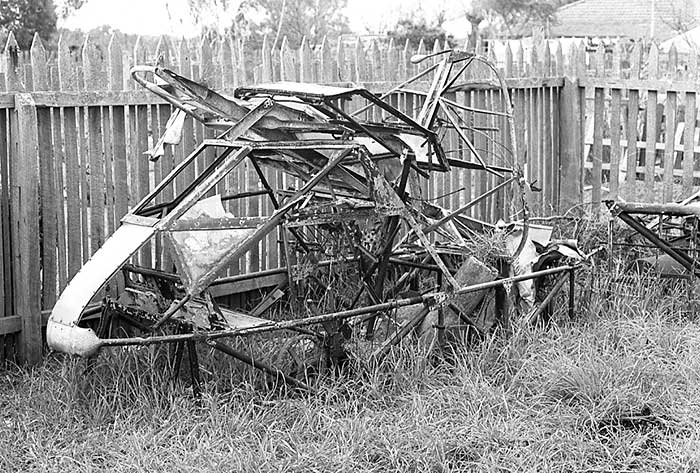
| .34 | Built by General Aircraft Ltd at Croydon as ST.11, which was the ST-10 model fitted with retractable undercarriage. 2 x Pobjoy Niagara 1 engines with 2 bladed propellers |
| Painted as VH-USN in the factory to the order of Eastern Air Transport, Sydney | |
| British CofA issued | |
| 4.1.35 | Departed
Croydon on delivery flight to Australia flown by Australian Daniel
F.Collins and carrying EAT company secretary D.S.Wylie. |
| 30.1.35 | Reached Darwin on delivery, continued to Sydney landing at Mascot late afternoon 1.2.35 |
| 12.2.35 | Registered VH-USN Eastern Air Transport Ltd, Sydney NSW This was a newly-formed company planning a Sydney-Canberra airline service. Principles were D.F.Collins and Secretary D.S.Wylie. Collins was an experienced pilot previously an instructor with Royal Aero Club of NSW and Kingsford Smith Air Service, Sydney. |
| 12.2.35 | Australian CofA issued at Mascot |
| .37 | Eastern Air Transport Ltd was taken over by Kingsford Smith Air Service Ltd, Mascot NSW |
| Retractable undercarriage replaced by fixed main gear. | |
| 11.6.38 | Civil Register ownership change to Kingsford Smith Air Service Ltd. |
| 16.9.40 | KSAS was take over by Airflite Ltd, Mascot NSW |
| 42 | Retired by now, stored for the duration of the war. Airflite ceased operations. |
| 3.6.47 | Struck off Civil Register "converted to spares" |
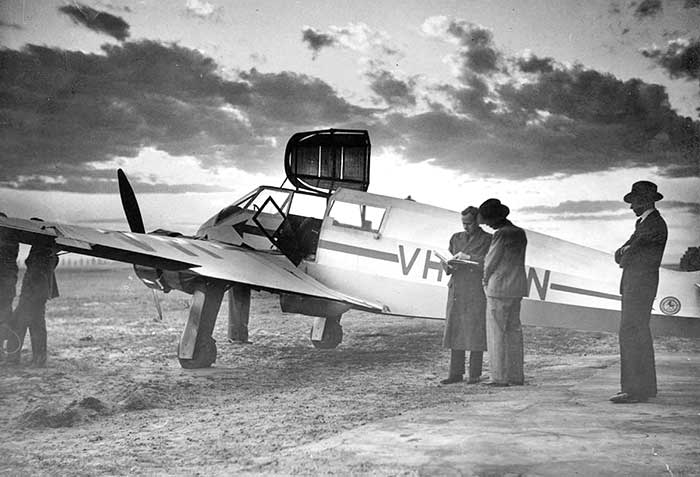
Collins (centre, left) is showing his logbook to Shell aviation officer E.D.Thane. NLA Hood Collection
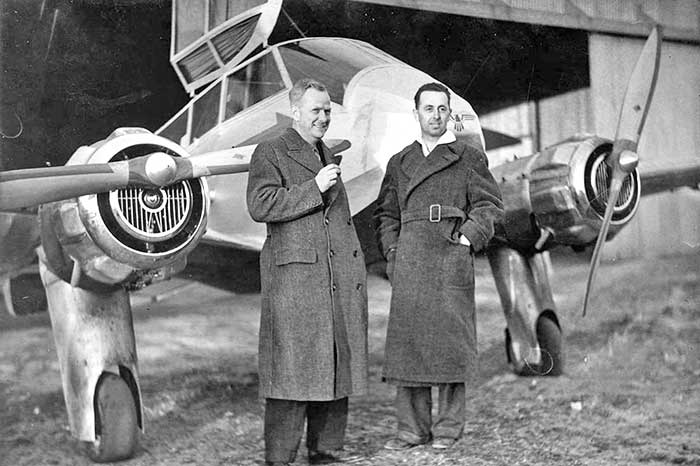
NLA Hood Collection
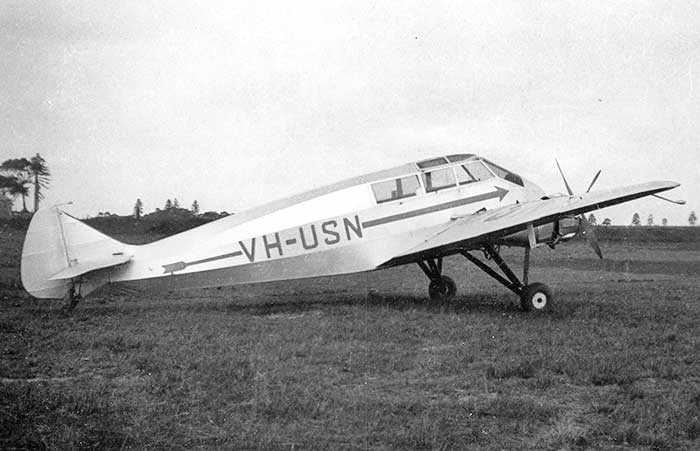
non-standard fixed gear. Frank Walters collection
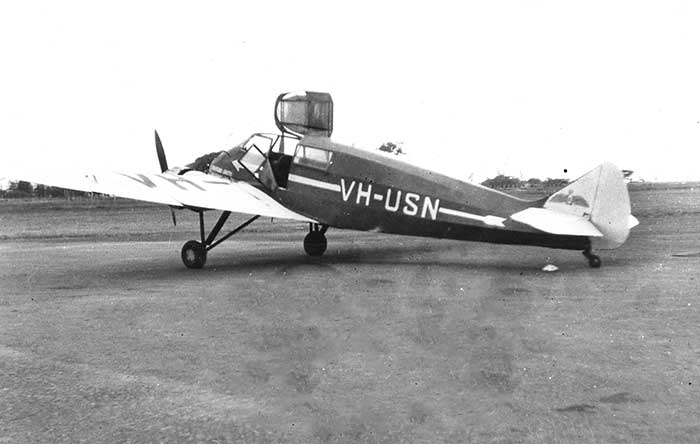
Frank Walters collection
| .34 | Built by General Aircraft Ltd at Hanworth
as production ST.10. 2 x Pobjoy Niagara 1 engines with 4 bladed propellers |
| British CofA issued | |
| Shipped to Australia to the order of GAL agents Robert Bryce & Co, Melbourne Vic | |
| 26.2.35 | Australian CofA issued after assembly |
| 26.2.35 | Visited Narromine to promote a new air service to by flown by WASP Airlines using this new Monospar. |
| 28.2.35 | Registered VH-UST: Robert Bryce & Co, Melbourne Vic |
| 13.3.35 | Change of ownership: Western and South Provincial Airlines Ltd trading as WASP Airlines, Sydney NSW. |
| 25.3.35 | In a ceremony at Narromine NSW, aircraft was named Narromine Wasp by WASP Airlines' major financial backer, Narromine grazier Mr.T.E.Perry. That afternoon pilot Captain Harry Purvis flew the inaugural service Narromine-Sydney |
| 28.2.35 | Inaugural Sydney outbound
service to Narromine with optional stops at Bathurst, Orange, Subbu,
Young. Three return services per week. |
| 3.4.35 | Inaugural flight on route extension to Nyngan NSW |
| 35 | WASP
Airlines purchased Codock VH-URP and Tugan Gannet VH-UVU, adding more
routes including Sydney-Broken Hill and Young-Griffith-Leeton. |
| 20.6.36 | VH-UST refuelled at Longrach Qld enroute Sydney-Tennant Creek NT while on a 2 week charter, pilot Cyril Brett |
| 7.36 | WASP Airlines ceased operations due financial difficulties |
| 30.9.36 | Change of ownership: J. J. Larkin & J. N. Jackson, Mascot Aerodrome, Sydney NSW |
| Used for charter and
joyriding. Operated a long-term summer contract for shark patrols along
Sydney beaches, the pilot using a siren to warn swimmers of nearby
sharks. | |
| By 39 | 4 bladed propellers replaced by 2 bladed propellers |
| 19.11.39 | Destroyed Mascot NSW in mid-air collision with DH.60 Moth VH-UFV. The aircraft collided at low altitude while both were on approach to land at Mascot Aerodrome. The Monospar fell into Cook's River on the airfield boundary, while the Moth crashed on a nearby golf course. All on board VH-UST were killed: pilot Jack Jones and 3 passengers. |
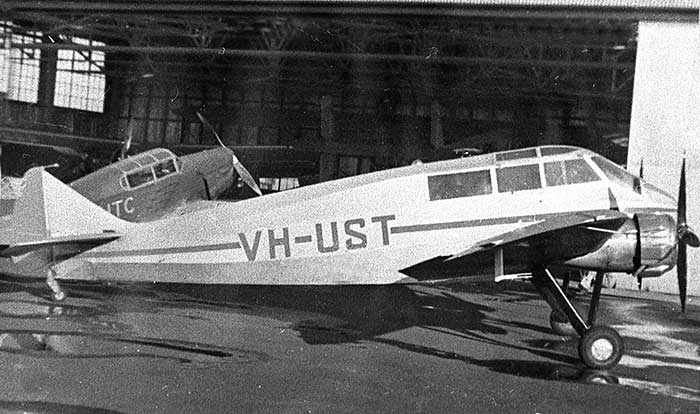
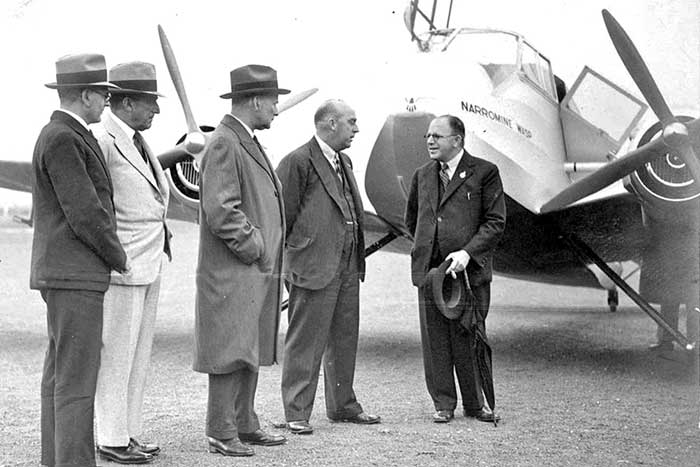
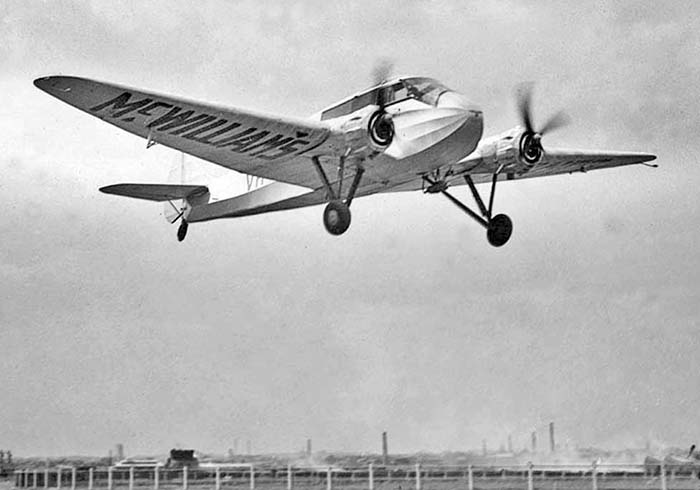
the fuselage to alert swimmers of nearby sharks. Under wing advertising is for McWilliams Wines.
State Library of NSW Hood Collection
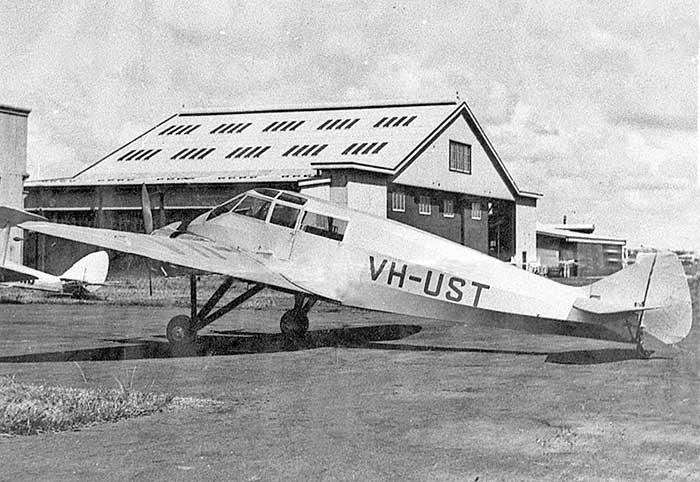
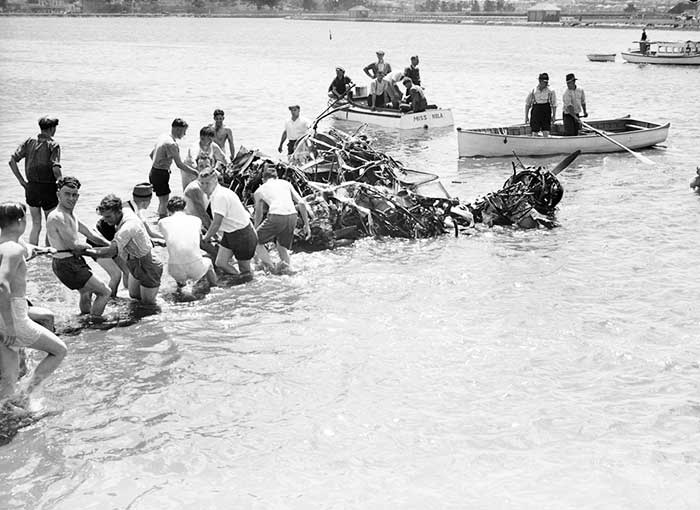
Both photographs from National Library of Australia
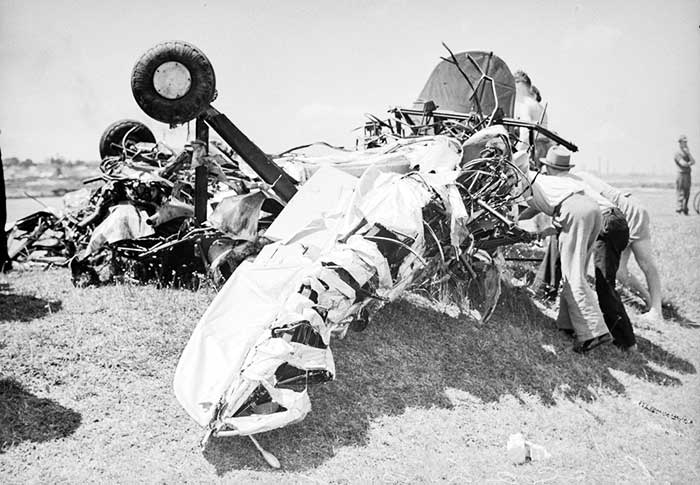
| .35 | Built by General Aircraft Ltd at Hanworth
as production ST.12. 2 x DH Gipsy Major 1 engines with 2 bladed propellers |
| 2.35 | Completed to the order of New England Airways, Sydney |
| 17.3.35 | Named
"Captain Cook" in a ceremony at the GAL works at Hanworth Aerodrome to
name the first two ST.12s for New England Airways. The austere British
magazine Aeroplane reported the event: "The ceremony was performed by Mrs.S.M.Bruce, wife of the Australian High Commissioner to Great Britain. The first two machines destined for Australia were successfully named Captain Cook and Captain Philip. Of course one of the massed photographers forgot to press something at the psychological moment and Mrs. Bruce was prevailed upon to beat an already well beaten bottle of Australian wine." |
| Shipped to Sydney as boxed cargo on board the liner Mongolia, along with VH-UTK | |
| 5.35 | Assembled at Mascot Aerodrome, Sydney by NEAW staff |
| 5.35 | Test flight Mascot afer assembly, pilot Keith Virtue, NEAW chief pilot |
| 16.5.35 | Registered VH-UTH: New England Airways Ltd, Sydney NSW |
| 16.5.35 | Australian CofA issued at Mascot |
| Operated on New England Airways services between Sydney and Brisbane | |
| 6.35 |
Flown by Captain
Keith Virtue on a survey flight along the proposed route extension from
Brisbane north to Townsville, carrying NEAW Managing director
G.A.Robinson and Shell Oil aviation manager Frank Briggs. Departed
Mascot 4am, reached Townsville late that day in 10 hrs 10 mins flying time. |
| 1.1.36 | Company renamed Airlines of Australia Ltd, Sydney NSW |
| 11.6.36 | Damaged
in a night forced landing near Beaudesert Qld during a scheduled
Sydney-Brisbane
service. pilot John McLaughlin and one passenger unhurt, the second
passenger, former Australian Prime Minister W.T. "Billy" Hughes was
injured: Hughes was Chairman of associate Oceanic Airways Ltd. injured. McLaughlin's report to CAB highlights airline flying prior to radio navigation aids: "I left Sydney at 12.30pm and refuelled at Old Bar and Lismore. I left Lismore at 4.25pm in fairly good weather and flew up the coast towards Brisbane. After passing Southport the weather became thick but I thought I could find the mouth of the Brisbane River and follow it up to Brisbane. However it closed down at Wynnum just before the river and as light was fading I came down low over Wynnum and circled for 15 minutes trying to find a place to land. As it was now dark and raining I had no choice but to try to get back to Southport. As soon as I left Wynnum I went blind flying because the clouds by this time were right down in the trees and it was raining heavily. I flew blind for about 45 minutes then came through a break in the clouds and saw a town right underneath me. I circled above the town until the residents drove their cars to a paddock where, with the aid of their cars' headlights, I was able to land. As the aircraft was finishing its run, the starboard wing hit a fence at the bottom of the paddock." |
| Rebuilt by AoA at Mascot | |
| 30.6.38 | Change of ownership: P. H. Moody Air Taxis Pty Ltd, Rockhampton Qld |
| 16.2.39 | Change of business name: Air Taxis Pty Ltd, Rockhampton Qld |
| 29.3.41 | Change of ownership: Butler Air Transport Co, Sydney NSW |
| 2.12.46 | Change of ownership: Kingsford Smith Aviation Services, Mascot Aerodrome, Sydney |
| KSAS was a
maintenance and sales business founded in 1945 by experienced
aeronautical engineer John T. Brown. His son, Peter Brown DFC joined
the company during 1946 on return from wartime flying. Peter wrote this
account of his experiences with VH-UTH: "I first became acquainted with the Monospar in November 1946. At that time the need was felt for a twin engined aircraft to supplement our flying school and charter operations. Butler Air Transport, based in the hangar next door at Mascot offered us a Monospar then based at Charleville Queensland and surplus to their requirements. With ex RAAF Dragons in demand by the airlines, there was no immediate alternative, we purchased the Monospar sight unseen. Butlers ferried it to Mascot. Still in wartime camouflage paint, first sight of this snub nosed, bandy legged aeroplane was not inspiring. However after a quick check flight with Percy Lusk, Butler's only endorsed Monospar pilot, followed by an hour on my own exploring its flight parameters, I began to respect and like the little beast. Shortly after acquisition it was given at thorough going over both mechanically and cosmetically. Fabric was rejuvinated and a fresh silver paint finish applied, engines top overhauled, new coarser pitch props fitted to improve cruise speed. It was quite comfortable, having a rear double seat hammock, the front seats with forward tilting back rests formed the top of the main fuel tank, suitably cushioned. Fuel system was basic with selection through a rotary valve on the centre front floor feeding both engines from either main or auxiliary tank. VH-UTH had the disconcerting habit of cutting both engines when the auxiliary was selected, with power being restored only after 30 seconds of anxious looking for a forced landing site. I suspect the trouble lay with the venting of the rear tank and this was never really solved. The centrally-mounted control column incorporated a swing over wheel to provide a margin of dual control. Despite the lack of equipment, the Monspar survived a large number of initial twin conversions and many hours of hire and charter operations. Once in the air, it was pleasant and easy to fly, controls were light and responsive and a cruise of 110 to 120 mph could be maintained at 1900 rpm with judicious trimming. VH-UTH served KSAS extraordinarily well during two ownership periods, completing many successful twin conversions, countless hours of charter and aerial work and many pleasantly remembered private hire excursions." |
|
| 1.12.47 |
Annual CofA expired, KSAS advise DCA they do not intend renewing at this time |
| 19.12.47 | Struck-off Civil Register |
| 8.5.49 |
Tasmanian Aero Club announced that the
Club would take delivery of a twin-engined Monospar aircraft later that
year. The aircraft could carry 3 passengers or fitted with a stretcher.
The Tasmanian State Government had made a £2,000 grant towards its
puchase, conditional on the aircraft being made available for ambulance
and emergency flights within Tasmania and to Bass Strait islands. The
club Chief Flying Instructor Mr.Ron Munro said the Monspar had dual
controls and would be used for twin-engined pilot training. |
| 49 |
VH-UTH was restored to airworthy by KSAS. At that time KSAS, Marshall Airways and Royal Aero Club of NSW were in the process of moving from Sydney Airport (Mascot) to the former RAAF airfield Bankstown Aerodrome. The move was required by the Department of Civil Aviation so that the original prewar hangars could be cleared to make way for new airport buildings. Whether VH-UTH was restored at Mascot or Bankstown is not known |
| 17.10.49 | Sale document from KSAS to Tasmanian Aero Club, Launceston. |
| 26.10.49 | CofA and CofR renewed: Tasmanian Aero Club, Launceston Tas |
| 28.10.49 |
Arrived at Launceston on delivery from Sydney, flown by instructor Reg Munro. |
| 25.2.50 |
The Monospar flown by R. Munro and I.Scown dropped small gas-filled balloons over Launceston city as part of a local event |
| 25.3.50 |
Eight
Aero Club aircraft including the Monospar took part in an air race from
Launceston to Wynyard in conjunction with an airshow at Wynyard. |
| 11.6.50 |
Tasmanian
Aero Club Wackett Trainer, Tiger Moth and Monospar flew to Devonport to
spend the weekend there to promote learning to fly |
| 4.11.50 |
A number of
Tasmanian Aero Club aircraft including the Monospar visited an airshow
at Devonport. The RAAF sent four Mustangs and a Dakota from Laverton
and open to the public on the ground were a TAA Convair 240 and an ANA
Bristol Freighter. |
| 5.11.51 |
Tasmanian Aero
Club's Monospar and a Tiger Moth made a night search for a missing
fishing boat, before landing at Devonport where the strip was lit by
the headlights of 100 motor cars. DCA explained that runway lighting was installed at Devonport Aerodrome but was not yet commissioned. |
| 19.11.51 |
VH-UTH
flown by Tasmanian Aero Club pilot D.G.Morrison diverted to Bridport
Tasmania due to poor weather while on a flight from Flinders Island to
Launceston. It was a charter flight, carrying a DCA engineer. After the
storm passed, they continued on to Launceston. |
| 25.11.51 |
The Monospar was at Wynyard for the day, conducting local pleasure flights |
| 3.52 |
Tasmanian
Aero Club CFI Mr. Ken Frewin announced that the club had exchanged the
twin engined Monospar for a single engine Auster J2 Arrow because of
demand for additional basic training aircraft |
| 13.3.52 |
VH-UTH departed Launceston on delivery flight to Sydney, flown by Tasmanian Aero Club pilots D.Morrison and H.Atherton. |
| 15.3.52 | Change of ownership: Kingsford Smith Aviation Services, Bankstown Aerodrome, Sydney |
| 24.10.54 | Change of ownership: Whitfield Construction Co, Sydney NSW c/- F. H. Whitfield |
| 17.11.55 | Change of ownership: Austral Motorcycles Pty Ltd, Newcastle NSW |
| 11.4.56 | Change of ownership: L. G. & E.M. Taylor, Armidale NSW |
| 6.56 | VH-UTH visited Moorabbin Vic, all silver "Monospar" on tail |
| 4.3.57 | Change of ownership: Dr. John Morris & N. Fortune, Sydney NSW |
| 5.57 | Leased to Fawcett Aviation/ Illawarra Flying School, Bankstown NSW |
| 1.6.57 | Change of ownership: M. R.Morris & L. A. Harrison, Sydney NSW |
| 7.6.58 | Change of ownership: M.R.Morris, Sydney NSW |
| 14.4.61 | Change of ownership: Dr. John Morris, Sydney NSW |
| 18.8.61 | Departed
Sydney on holiday flight to England by Dr. John Morris and Bruce
Harrison. Their stated intention was to sell the aircraft in England to
finance their airline flights home. |
| 22.8.61 | Departed Darwin bound for England |
| 20.9.61 | VH-UTH noted refuelling at Nicosia, Cyprus enroute to Athens |
| 30.9.61 | Reached Lympne Aerodrome, England where they cleared British Customs. 120 hours flying time. He later published a book Two Men in a Flying Machine describing the trip. |
| 21.10.61 | VH-UTH noted flying over North London |
| 1.6.62 | VH-UTH noted parked outside at Redhill Aerodrome, London |
| 1.64 | VH-UTH
noted at Panshangar Aerodrome, standing outside with wings removed
outboard of the engines. Has been here for some time, deteriorated due
exposure to weather. |
| 8.5.64 | Moved to Croydon Aerodrome
where taken into Rollason's hangar for assessment of a restoration to
airworthy. |
| 17.8.64 | Sold by Dr. John Morris to Norman H. Jones, Redhill Aerodrome, Surrey |
| 17.8.64 | Struck-off Australian Civil Register (back-dated) as Sold Abroad |
| .64 | Moved to Booker Air Park for planned overhaul by Personal Plane Services |
| 21.5.66 | VH-UTH noted at Booker in PPS hangar. Overhaul not carried out. |
| .68 | Acquired in poor condition by Newark Air Museum, Newark, Winthorpe |
| .70 | Collected by museum from Booker and transported to Winthorpe |
| Long-term
restoration to display standard commenced at the museum. Wings and
later the fuselage were sent to Cotswold Aircraft Restoration Group at
Innsworth for detailed restoration before return to the museum
for reassembly. Restoration completed in 2020. | |
| Current, restoration completed at Newark Air Museum, displayed as VH-UTH |
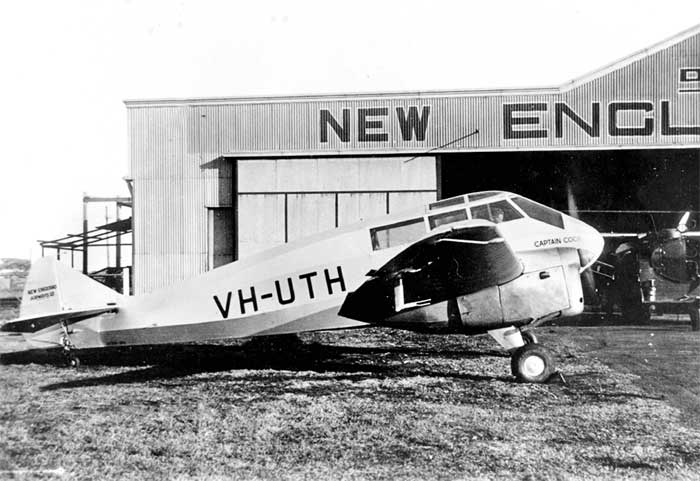
Ben Dannecker collection
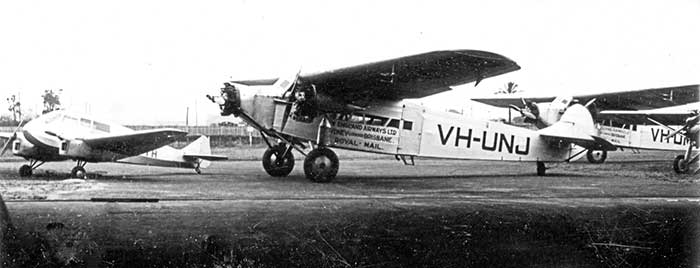
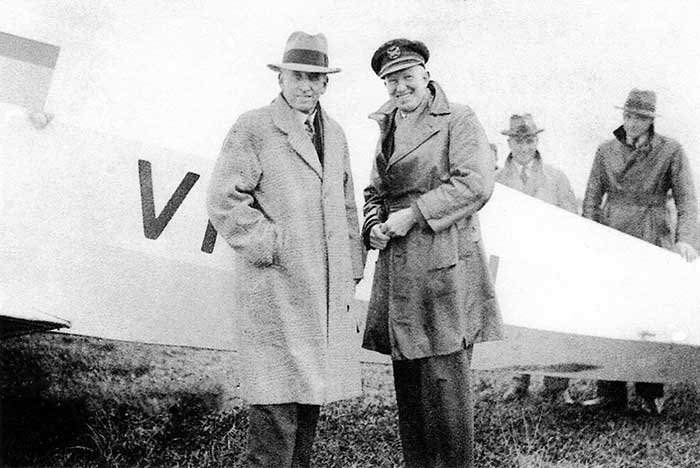
and senior pilot Keith Virtue inspect their new Monospar VH-UTH. Bruce Robinson collection
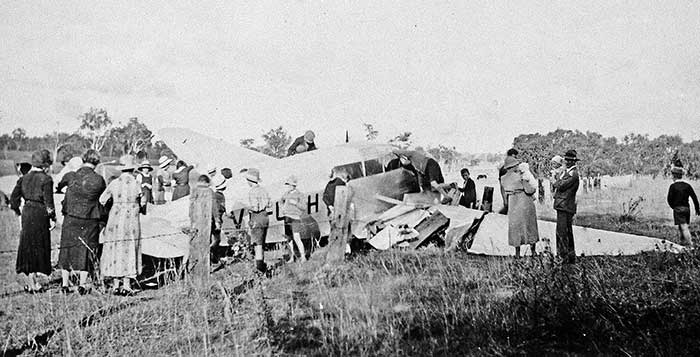
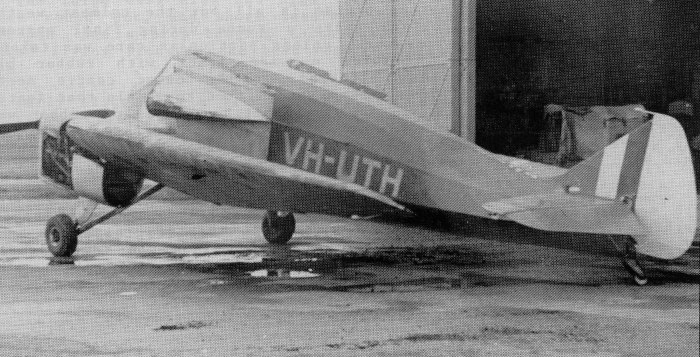
This view shows the standard Monospar folding wings arrangement to ease hangar parking space. Photo: Peter Brown
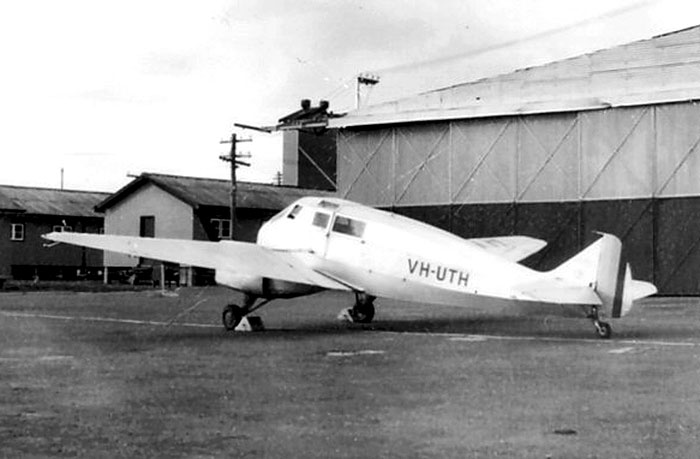
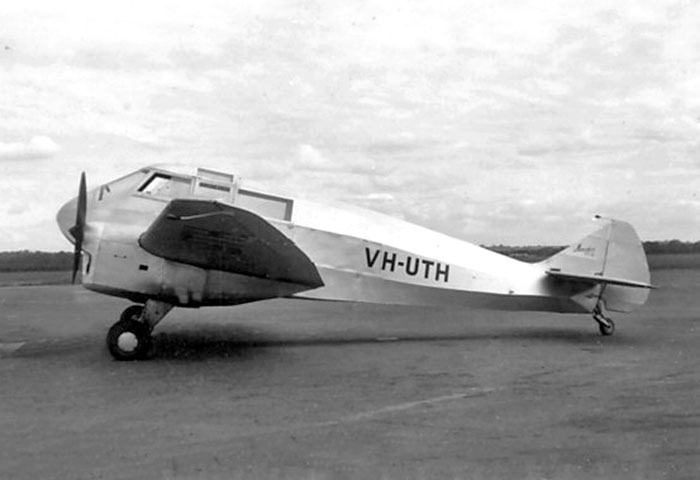
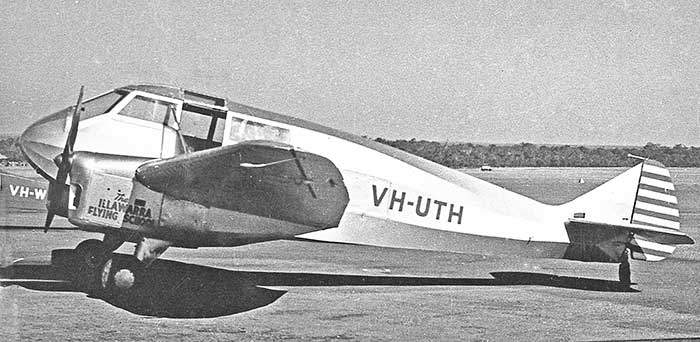
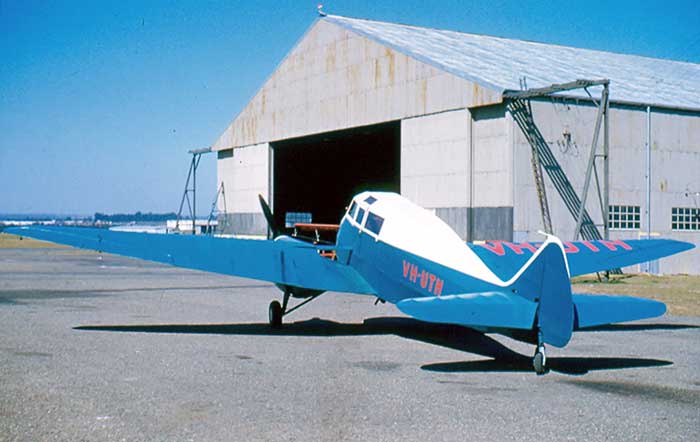
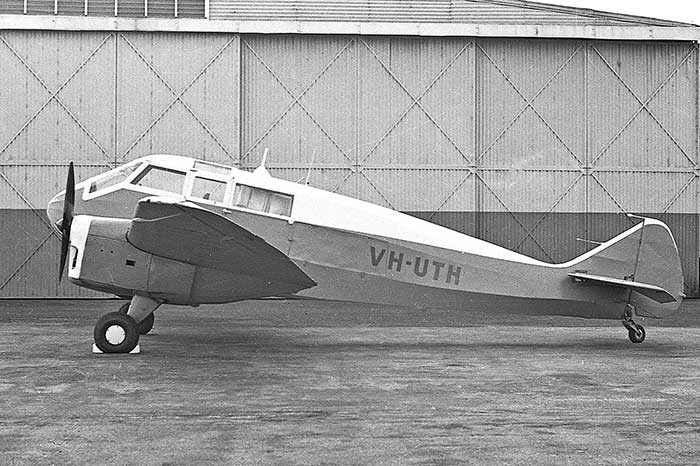
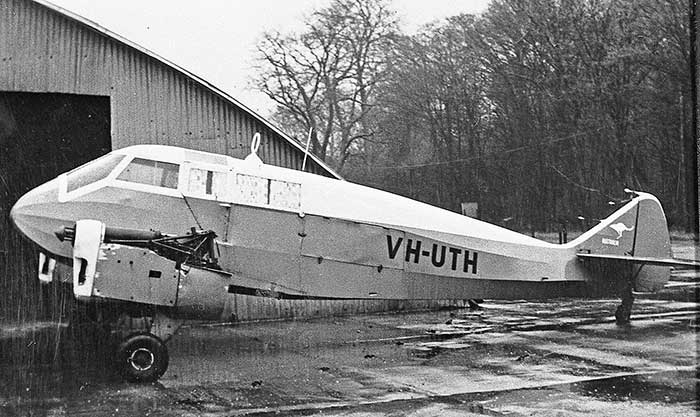
Neil Follett collection
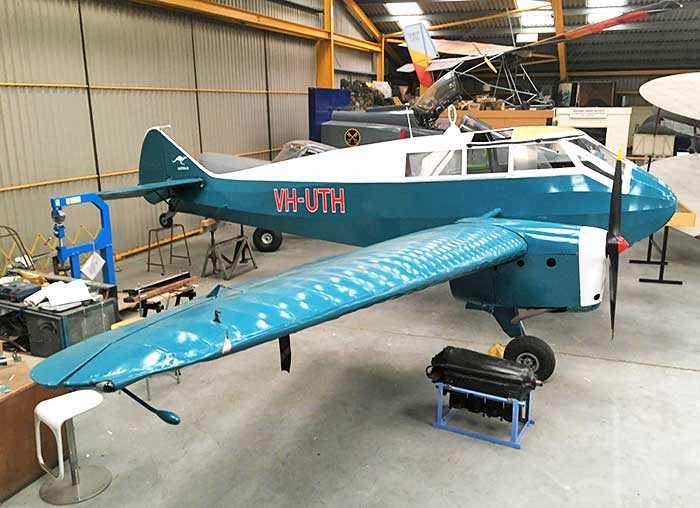
| .35 | Built by General Aircraft Ltd at Hanworth
as production ST.12. 2 x DH Gipsy Major 1 engines with 2 bladed propellers |
| Completed to the order of New England Airways, Sydney. | |
| 17.3.35 | Named "Captain Phillip" in a ceremony at the GAL works at Hanworth
Aerodrome to name the first two ST.12s for New England Airways. The
austere British magazine Aeroplane reported the event: "The ceremony was performed by Mrs.S.M.Bruce, wife of the Australian High Commissioner to Great Britain. The first two machines destined for Australia were successfully named Captain Cook and Captain Phillip. Of course one of the massed photographers forgot to press something at the psychological moment and Mrs. Bruce was prevailed upon to beat an already well beaten bottle of Australian wine." |
| Shipped to Sydney as boxed cargo on board the liner Mongolia, along with VH-UTH | |
| Assembled at Mascot Aerodrome, Sydney by NEAW staff | |
| 5.35 | Test flight Mascot afer assembly, pilot Keith Virtue, NEAW chief pilot |
| 31.5.35 | Registered VH-UTK: New England Airways Ltd, Sydney NSW |
| 31.5.35 | Australian CofA issued at Mascot |
| 17.6.35 | Departed
Mascot for Alice Springs on charter to Sir Donald McKay's 1935 McKay
Aerial Reconnaissance Survey Expedition exploring central Australia.
Flown by expedition pilot Captain Frank Neale. Returned to Sydney
late July 1935. |
| 1.1.36 | Company renamed Airlines of Australia Ltd, Sydney NSW |
| 12.36 | Entered
in the Brisbane-Adelaide Air Race by Miss Ivy Pearce, fiance of AoA
senior Captain Jason Hassard who was the nominated pilot. |
| 16.12.36 | Departed Archerfield Aerodrome, Brisbane as race Number 45, along with 30 other entrants. The three day race reached Parafield Aerodrome, Adelaide on 18 December 1936. VH-UTK's flying time was 8 hrs 40 mins. Ivy and Jason married soon after the race. |
| 37-38 | Mostly used on AoA Queensland coastal services between Brisbane-Townsville |
| 1.7.38 | Destroyed by fire on ground, Mackay Qld. Operting Airlines of Australia service from Brisbane to Townsville. Captain C.F.Moore was starting engines at Mackay when the port engine back-fired and set fabric alight, starting a fire which resulted in a fuel tank exploding. Captain Moore used the aircraft's fire extinguisher, but the aircraft was burnt out, only the starboard engine could be salvaged. No injuries. |
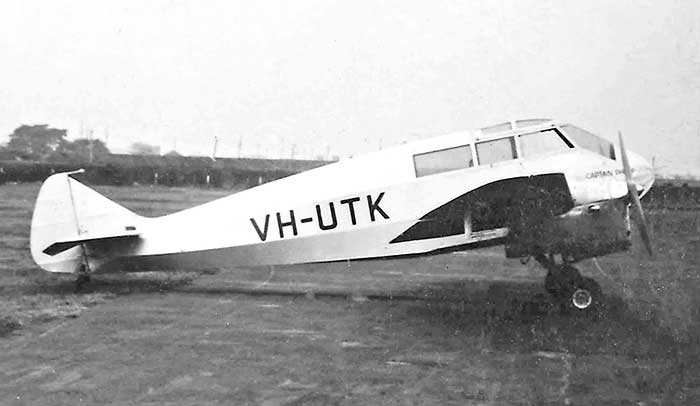
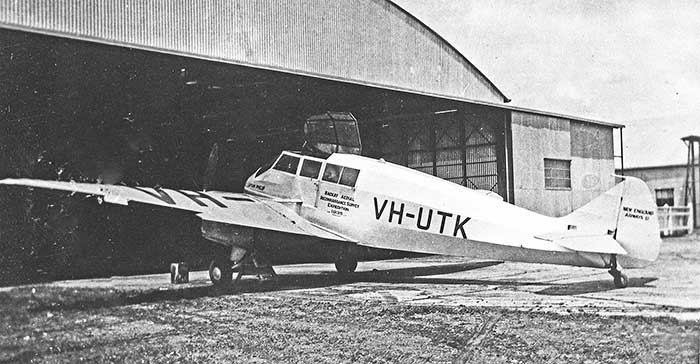
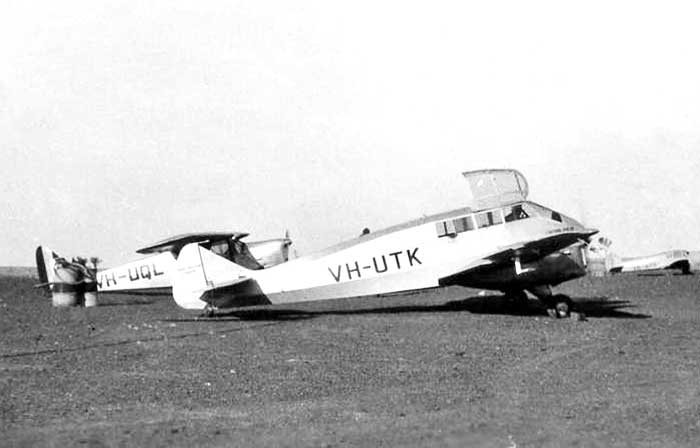
the far north of South Australia during the survey of Central Australia. Robert Millburn collection
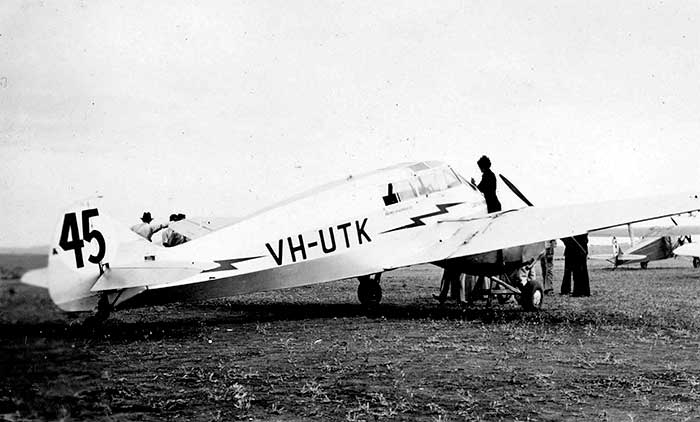
The Monospar was still all silver but had gained a lightning flash down the fuselage sides.
Photo by Allan Betteridge via Civil Aviation Historical Society
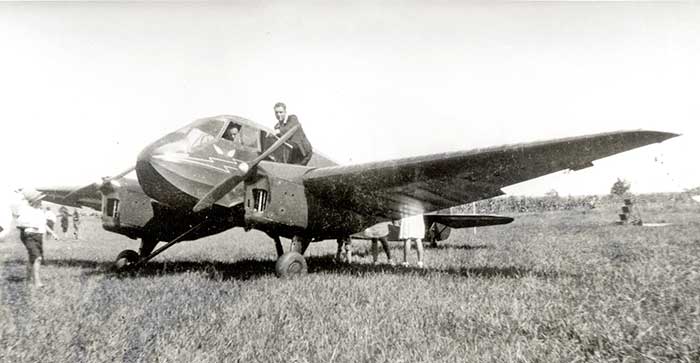
John Hopton Collection
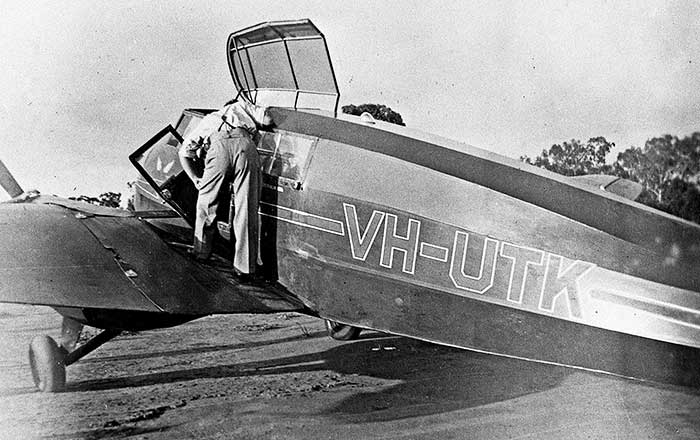
| .35 | Built by General Aircraft Ltd at Hanworth
as production ST.12. 2 x DH Gipsy Major 1 engines with 2 bladed propellers |
| Completed to the order of New England Airways, Australia | |
| Shipped to Australia to the order of New England Airways, Sydney. | |
| 2.8.35 | Registered VH-UTM: New England Airways Ltd, Sydney NSW |
| 2.8.35 | Australian CofA issued |
| 4.8.35 | Named Captain Flinders in a ceremony at Lismore NSW by Mayor of Lismore. Its initial use would be on air services linking Lismore with Sydney and Brisbane. |
| 8.8.35 | Minor damage to undercarriage, wheel ran into a hole while taxying at Casino NSW |
| 1.1.36 | Company renamed Airlines of Australia Ltd, Sydney NSW |
| 7.12.38 | Change of ownership due merger: Australian National Airways Pty Ltd, Melbourne Vic |
| 6.4.40 | Transferred back to Airlines of Australia Ltd, Sydney NSW To replace aircraft impressed by Government for wartime RAAF. Used by AoA on Queensland coastal scheduled services between Brisbane and Horne Island. |
| 16.2.42 | Wrecked in forced landing near Oxford Bay, Cape York Peninsular Qld. Operating an AoA service from Horn Island to Cairns, Captain Stewart G. Hack encountered strong winds and weather and decided to make a forced landing on aflat area near the coast. Undercarriage was torn away by hidden rocks, no injuries to pilot or one passenger. Aircraft posted missing and search commenced, located 3 days later by a company Stinson A flown by Clive Jones. 4 days after the crash, pilot and passenger were picked up by a coastal ship despatched to rescue them. |
| 2.42 | The aircraft was stripped of useful parts and the wreck pushed over a cliff. |
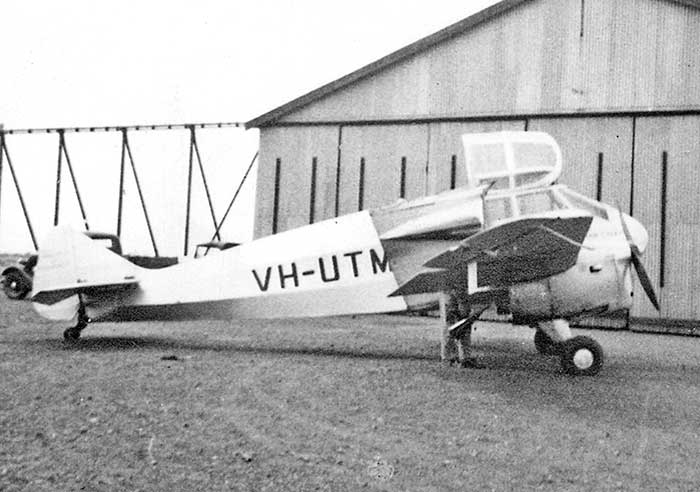
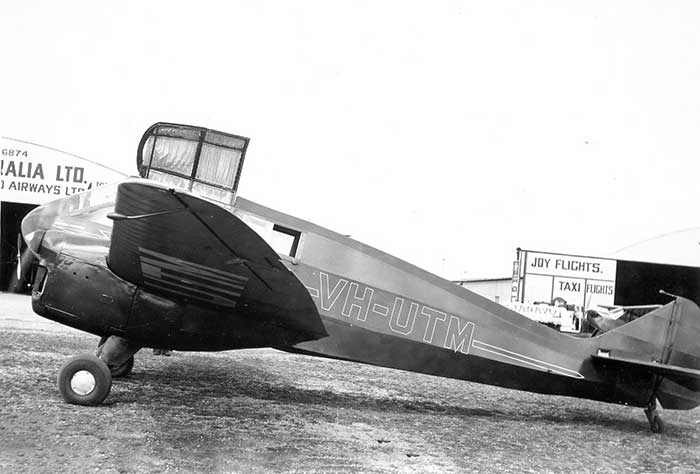
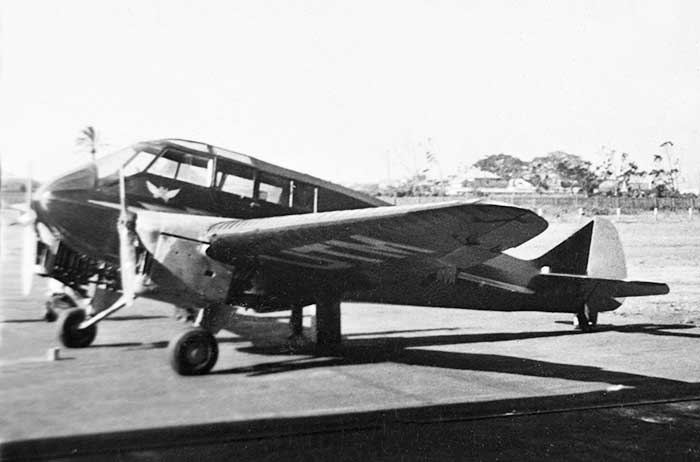
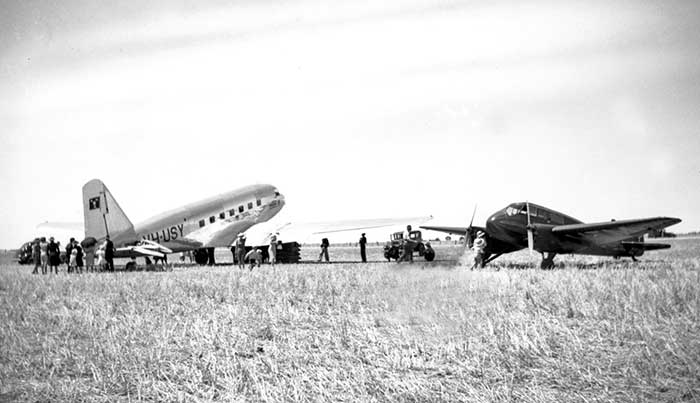
Two months later the Monospar was transferred back to Airlines of Australia for Queensland routes.
Kevin O'Reilly collection
| .35 | Built by General Aircraft Ltd at Hanworth
as production ST.12. 2 x DH Gipsy Major 1 engines with 2 bladed propellers |
| British CofA issued: Robert Bryce & Co Pty Ltd, Melbourne Vic (GAL agents for Australia) | |
| Shipped to Australia to the order of Eastern Air Transport, Sydney. | |
| 12.7.35 | CAB Inspection report after completion of assembly at Mascot NSW |
| 12.7.35 | Test flight Mascot by J.Chapman |
| 15.7.35 | Registered VH-UTZ: Eastern Air Transport Ltd, Sydney NSW "in conjunction with Kingsford Smith Aviation Service" |
| 15.7.35 | Australian CofA issued |
| Eastern
Air Transport had been formed to operate airline services between
Sydney and Canberra with Monospars VH-USN and VH-UTZ. At the time this
second Monospar arrived, EAT had decided to develop an air service in
central Australia between Darwin and Adelaide. An associate
company Australian Transcontinental Airways was founded with nominal
capital £500,000, Directors Sir Charles Marr, H.J. Berryman, D.S. Wylie (EAT), Capt E.A. Mustar, and E.E. Collins (Manager). Avro 10 VH-UXX was purchased as the first airliner for the long route | |
| 8.35 | Change of ownership: Australian Transcontinental Airways Ltd, Adelaide SA |
| 30.7.35 | Manager E.E.Collins arrived in Darwin a Monspar flown by John Chapman to make a route survey Darwin-Alice Springs-Adelaide |
| 19.8.35 | Avro
10 VH-UXX departed
Adelaide on inaugural ATA service to Darwin flown by Chief Pilot John
Chapman with copilot/engineer B.Cowan,carrying 4 passngers and airmail.
On the return flight south from Darwin on 22.8.35, the centre engine
failed and the Avro diverted to land at Daly Waters NT. |
| 8.35 | Monospar VH-UTZ was substituted while VH-UXX waited for a replacement engine |
| 3.9.35 | Forced
landing on a track at Kelly's Well NT near Tennant Creek, while en
route Alice Springs-Tennant Creek, no damage. Adverse winds had
resulted in low fuel so pilot decided to land. A man camping at
the well drove the passengers to Tennant Creek and brought back fuel
for the aircraft. Pilot then flew to Tennant Creek to continue the
service. |
| 6.9.35 | Crashed during forced landing Alawalla Ridge, 80 miles north of Alice Springs NT. Forced landing in a clearing in the scrub due inability to maintian altitude after the starboard engine failed. Port wing struck a large bush, swung the aircraft around and hit another bush. VH-UTZ had departed Tennant Creek NT for Alice Springs flown by pilot M.V. Mather with two passengers, but failed to arrive. |
| Aerial search commenced by ATA Monospar VH-USN from Sydney (ATA Chief Pilot John Chapman), MMA Fokker Universal VH-UJT from Adelaide (Captain Cyril Kleinig) and Percival Gull VH-UTC from Sydney (Pat Hall) | |
| 8.9.35 | VH-UTZ crash site located. Mather and this two passengers were not hurt and had walked out for help. |
| A DH.60 Moth was chartered
from Mildura Vic flown by H.F.Boson to retrieve the aimail carried on
VH-UTZ and deliver it to Adelaide, where it arrived 11.9.35. | |
| 9.35 | VH-UTZ was salvaged by
Queensland Assurance Co and transported by rail, arriving Adelaide
27.9.35. Moved to Parafield Aerodrome where stored in SAAirways hangar |
| CAB investigation report on VH-UTZ forced landing was highly critical of the airline. The aircraft was 84 lbs over loaded when it departed Tennant Creek and fuel in cans was carried in the cabin to allow fuel to be topped up in flight - both breaches of Air Navigation Regulations. "From general observation and information gained, the air servuce from Darwin to Adelaide has no organisation whatever. This service is doing aviation considerable harm and the people of central Australia have lost all confidence." | |
| ATA protested to CAB
regarding the findings of the accident report, debating whether the aircaft was
over-loaded. The quoted regulation breaches had allowed their insurance
company to decline paying out the the loss of te aircraft. | |
| VH-UTZ was not rebuilt | |
| 28.7.36 | Struck-off Civil Register |
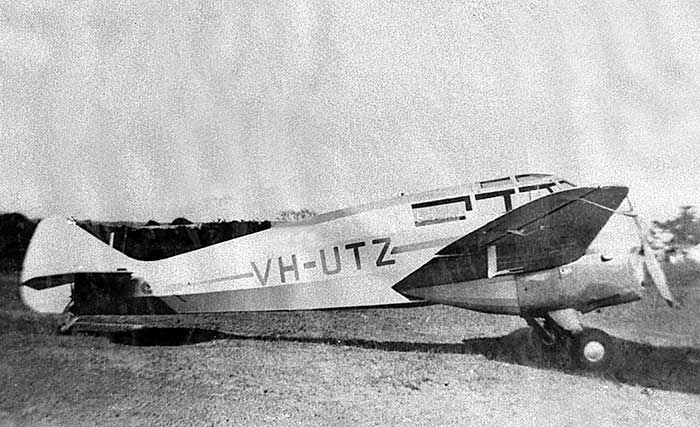
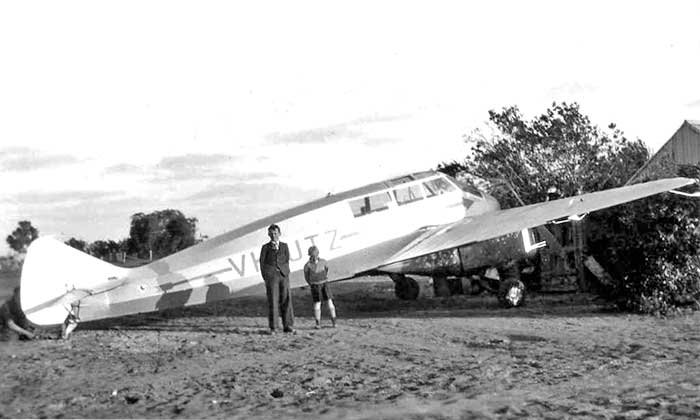
Robert Millburn collection
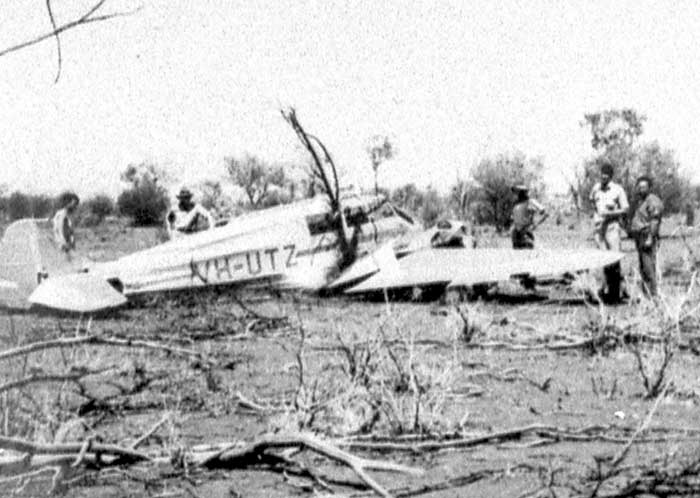
| Built by General Aircraft Ltd at Hanworth
as production ST.25. 2 x Pobjoy Niagara II engines with 2 bladed propellers | |
| Completed to the order of Adelaide Airways Ltd, Adelaide SA. This newly-formed company was owned by the Adelaide Steamship Co | |
| 8.35 | British CofA issued: Robert Bryce & Co Pty Ltd, Melbourne Vic (Agents) |
| 8.10.35 | Arrived Port Adelaide as boxed cargo on board SS Miamoma |
| 25.10.35 | Test flown Parafield Aerodrome, Adeiaide after assembly |
| 25.10.35 | Registered VH-UUV: Adelaide Airways Ltd, Adelaide SA |
| 25.10.35 | Australian CofA issued |
| 30.10.35 | Flew first Adelaide-Port Lincoln SA service, Captain Harold O. Cook. The previous day the new airline had operated its inaugural flight: Adelaide-Mt Gambier SA- Melbourne with Short Scion VH-UUT. |
| 19.11.35 | Flew first Adelaide Airways service to Broken Hill NSW where it connected with the scheduled WASP Airlines service to Sydney |
| 1.7.36 | Adelaide Airways took over
the Adelaide-Perth route following its purchase of West Australian
Airways Ltd. DH.89 Rapides operated most services on the long route,
but Monospar VH-UUV flew at least one service to Perth |
| 1.11.36 | Change of ownership due merger: Australian National Airways Pty Ltd, Melbourne Vic ANA name Boyana |
| 2.11.36 | Adelaide Airways routes were taken over by ANA |
| 38 | VH-UUV attached to ANA Flying School, Essendon for twin engined training |
| 8.10.38 | Badly damaged in forced landing Somerton near Essendon Vic. ANA pilot Lou Lohse and a company engineer were conducting a test flight from Essendon following an engine change. A loss of power caused a forced landing in a field where the undercarriage was torn away from the aircraft. No injuries. |
| Not repaired | |
| 14.6.40 | Struck-off Civil Register |
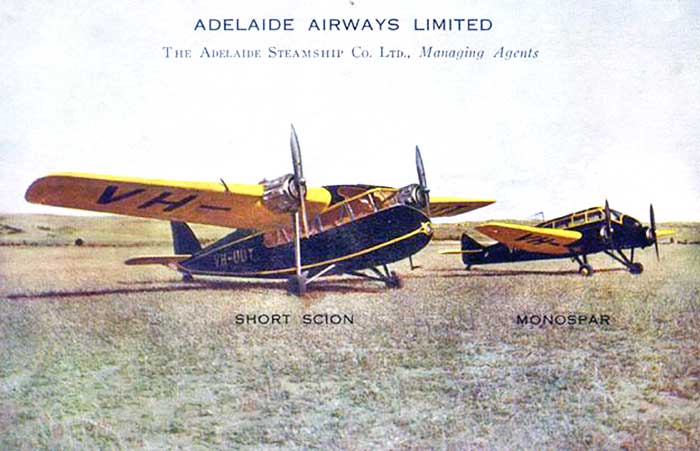
Courtesy Civil Aviation Historical Society
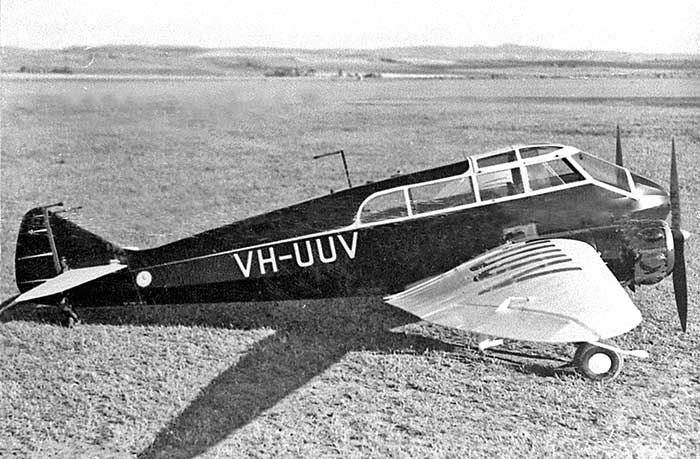
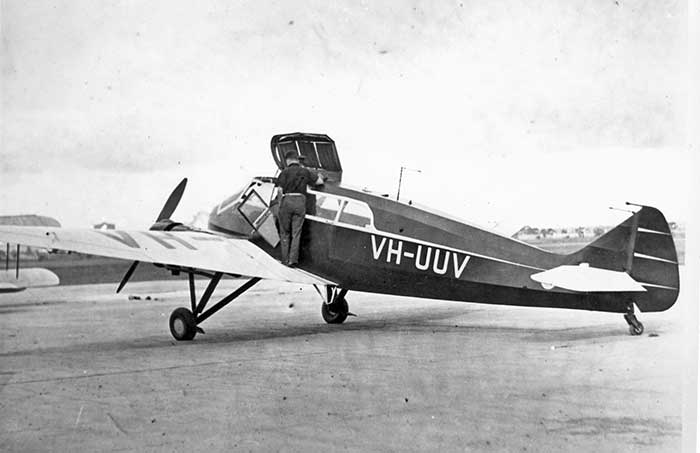
West Australian Airways in July 1936. Geoff Goodall collection
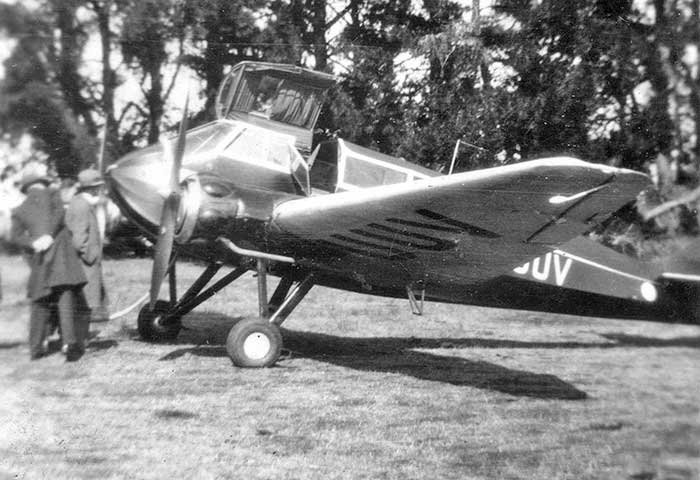
| .35 | Built by General Aircraft Ltd at Hanworth
as production ST.25. 2 x Pobjoy Niagara II engines with 2 bladed propellers |
| 9.10.35 | First flight Hanworth painted as VH-UVJ |
| 16.10.35 | British CofA issued: Robert Bryce & Co Pty Ltd, Melbourne Vic (Agents) |
| 10.35 | Shipped to Australia to the order of Airlines (WA) Ltd, Perth, Western Australia. |
| 11.35 | Assembled at Maylands Aerodrome, Perth |
| 27.11.35 | Inspection report after assembly by CAB inspector. Approval to operate pending formal issue of Australian CofR and CofA |
| 1.12.35 | Named Miss Wiluna in a ceremony at Maylands Aerodrome |
| 2.12.35 | Airlines (WA) Ltd Managing
Director Captain Charles W. Snook departed Maylands on a proving flight
along the newly-formed company's first airline route: Perth-Dalwallinu-Mount Magnet-Meekatharra -Wiluna-Kalgoorlie-Perth. Returned to Perth the following day. |
| 3.12.35 | Registered VH-UVJ Airlines (WA) Ltd, Perth, Western Australia |
| 3.12.35 | Australian CofA issued |
| 26.12.35 | Forced landing Boorabbin WA due high oil consumption, Capt Snook, no damage |
| 4.36 | Snook submitted plans to
CAB for modification to cockpit windscreen glass to reduce reflections
and visual distortions. Modifications to be carried out bySolent Engineering Works, Perth. |
| 12.5.36 | Port wheel damaged while taxying at Kalgoorlie WA |
| 10.8.36 | Delayed a day at Mount Magnet due port engine trouble |
| 1.9.36 | Forced landing Northam WA due engine power loss, Cpt A.L.Whitham, no damage |
| 16.11.36 | Forced landing Thundelarra Station WA due engine trouble, Cpt A.L.Whitham, no damage |
| 22.12.36 | Badly damaged during forced landing 12 miles from Mount Sir Samuel WA. Unable to maintain altitude due loss of power on the starboard engine while flying in very high temperatures at 6pm in the afternoon. Captain Charles Snook and 3 passengers unhurt |
| Damaged aircraft moved to Perth by road | |
| 9.37 | CAB
inspection report of the damaged aircraft in Airlines (WA) Ltd hangar
at Maylands. Repair work had not commenced, company waiting for
drawings from the manufacturer. |
| 10.37 | Airlines (WA) Ltd wrote to CAB advising they no longer intend to rebuild VH-UVJ |
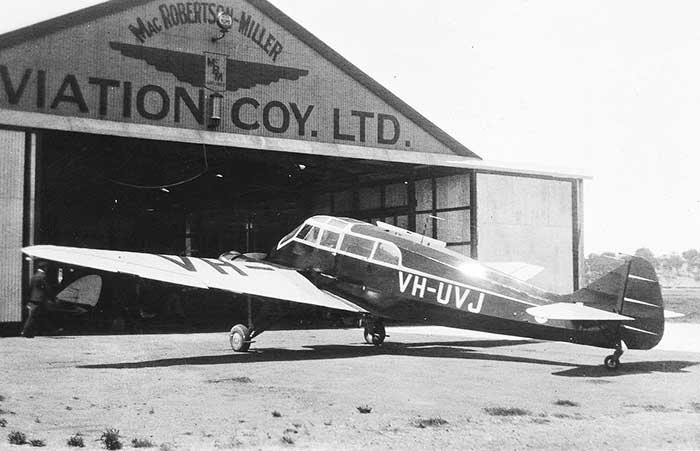
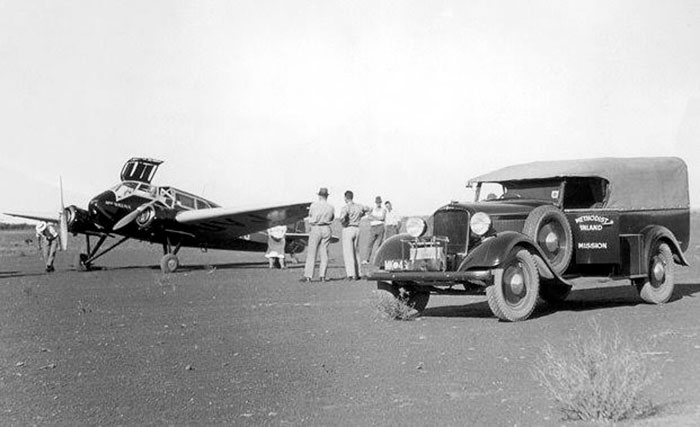
| Built by General Aircraft Ltd at Hanworth
as production ST.25. 2 x Pobjoy Niagara II engines with 2 bladed propellers | |
| British CofA issued: Robert Bryce & Co Pty Ltd, Melbourne Vic (GAL agents) | |
| Shipped to Australia | |
| 19.2.36 | Registered VH-UVM: Robert Bryce & Co Pty Ltd, Melbourne Vic |
| 19.2.36 | Australian CofA issued |
| No Australian sale eventuated, advertised in New Zealand | |
| Sold to Canterbury Aero Club, Christchurch NZ | |
| Shipped to NZ | |
| 14.10.36 | Struck-off Australian Civil Register as sold abroad |
| 10.36 | Registered ZK-AET Canterbury Aero Club, Christchurch |
| 10.39 | Impressed by NZ Government for Royal New Zealand Air Force as NZ584 |
| Retired by RNZAF, used as instructional airframe at Rongotai, Wellington | |
| 45 | Disposal as scrap |
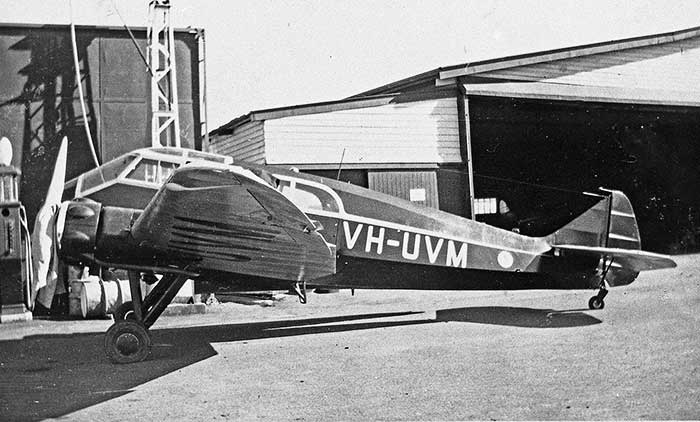
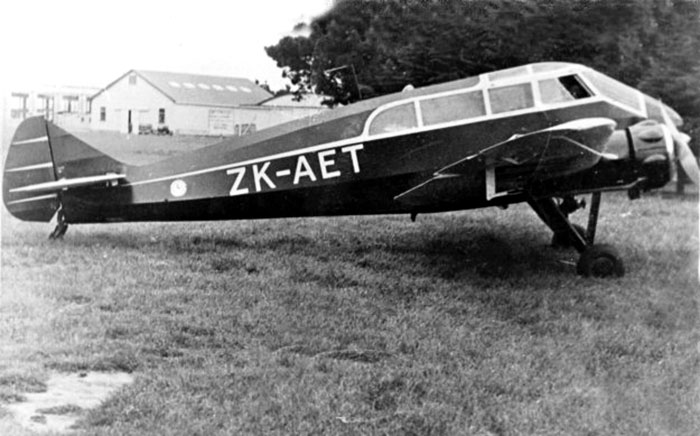
| .32 | Built by General Aircraft Ltd at Croydon
as first production ST.4. 2 x 85hp Pobjoy R engines. |
| 8.32 | Registered G-ABVN Portsmouth, Southsea and Isle of Wight Aviation Ltd, Portsmouth |
| 19.8.32 | CofA issued |
| 12.33 | Change of ownership: B. Lewis & Co Ltd, Heston |
| 4.12.36 | Change of ownership: Colin D. Kelman, 48 Gloucester Place, London W1 |
| Colin Dalrymple Kelman managed pastoral property Malaraway at Moree, NSW and
later owned Glenbervie at Julia Creek Queenland. He had met Mary "Peggy" Kelman ( nee McKillop) at Moree when she was flying a Moth on a barnstorming tour with Nancy Bird. When she sailed to live in England he followed and they were married in London. They purchased the Monospar to fly home to Australia. | |
| 18.12.36 | G-ABVN departed Heston on a holiday flight to Australia flown by Mr & Mrs Kelman |
| 11.1.37 | Reached Darwin |
| 15.1.37 | Reached Moree NSW. Flown for a short time on its current British CofA |
| G-ABVN reportedly soon sold due to a slump in wool prices | |
| Not registered in Australia.
Reasons unknown but the fact it was the only ST.4 model imported would
have required DCA first-of-type certification with the owner to supply
construction and performance documentation from the manufacturer. | |
| 38 | G-ABVN was in a hangar at Mascot Aerodrome, Sydney |
| Remained in the hangar
during WWII when the military took over the airfield. A report says it
was used by RAAF as an instructional airframe | |
| 23.6.45 | Letter to DCA from Mr. R.E.Turner, Sydney: he intends to purchase G-ABVN stored at Mascot. He says it is in very good condition,
missing only seats, some instruments and compass. He has the log books
and enquires if there are any known problems with the aircraft. No further correspondence in the DCA file. |
| 21.11.46 | Struck-off British Register |
| 54 | G-ABVN derelict at Bankstown Aerodrome, Sydney, fuselage without wings |
| The
Kelmans went on to own numerous aircraft at Julia Creek from Tiger
Moth, Auster and Proctor to Beech 17 and Cessna 182. After Colin's
death in the late 1950s, Peg Kelman and their son John set up Central
Highlands Air Taxi Service at Emerald Qld. She was later awarded an OBE for services to aviation. |
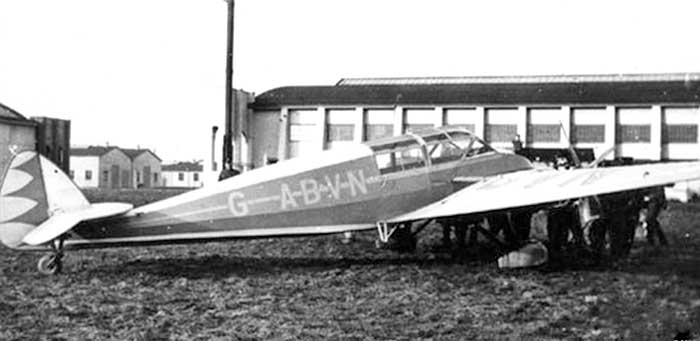
| 35 | Built by General Aircraft Ltd at Hanworth Aerodrome
as prototype ST.18 Croydon 10 passenger transport powered by two 450hp P&W R-985 Wasp Juniors. Metal frame construction with fabric covering |
| 16.11.35 | First test flight at Hanworth,
pilot Harry M. Schofield. Test flown in "Class B" markings as
"T.22" |
| 16.6.36 | CofA issued |
| The prototype performed
well, but did not attract any orders. It was decided a fast flight to Australia and return would promote the aircraft. Major C.R. Anson agreed to purchase the prototype and have his personal pilot Harold "Tim" Wood make the Australian tour. | |
| 2.7.36 | Registered G-AECB Claude Ronald Anson, Itchell Manor, Crondell Hampshire |
| 30.7.36 | Departed Croydon Airport, London for Australia, under the command of Harold Wood. Crew was second pilot Lord Sempill (who had recently flown his Puss Moth G-ABJU to Australia and back), flight engineer L. Davies, radio operator C.P.R. Gilroy. |
| A significant delay at Karachi enroute to Australia ended an attempt to break the record time. Lord Sempill left the flight at Karachi and General Aircraft Ltd's chief designer Mr. Frederick Crocombe joined the crew to represent the manufacturer. | |
| 12.9.36 | Demonstration flights to airlines and media at Melbourne-Essendon. |
| 6.10.36 |
Left Essendon on the return flight to Britain with the same crew. Reached Darwin same day |
| 7.10.36 | G-AECB
departed Darwin for Koepang, Timor at 4.47am local time. The crew were
planning to reach London in 5 days. However became unsure of position
while crossing the Timor Sea. |
| 7.10.36 | Forced landing on Seringapatam Reef, Timor Sea.
Tailwheel assembly was damaged by rocks. Crew were picked up by
native fishing boats and later transferred to a passing ship SS Nimoda bound for Durban, South Africa. |
| Aircraft abandoned | |
| 23.2.48 |
An MMA DC-3
operating a charter flight carrying Timorese pearl divers from Koepang
to Broome WA overflew Seringapatam Reef. MMA Captain Cyril Kleinig was
aware of the Monospar Croydon forced landing in 1936 and spotted the
tattered remains of G-AECB which he said was still in one piece. |
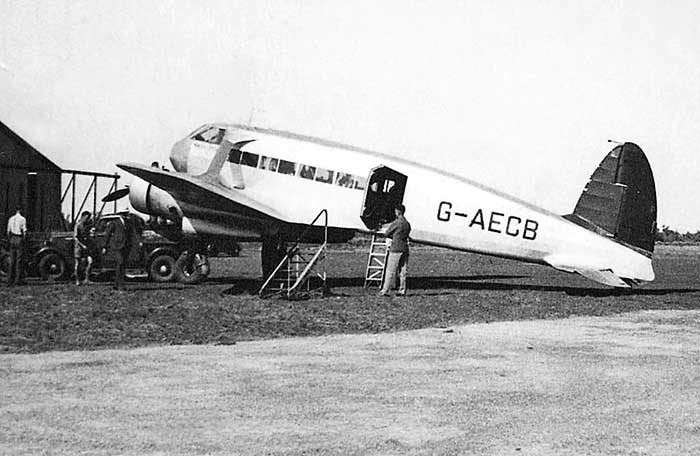
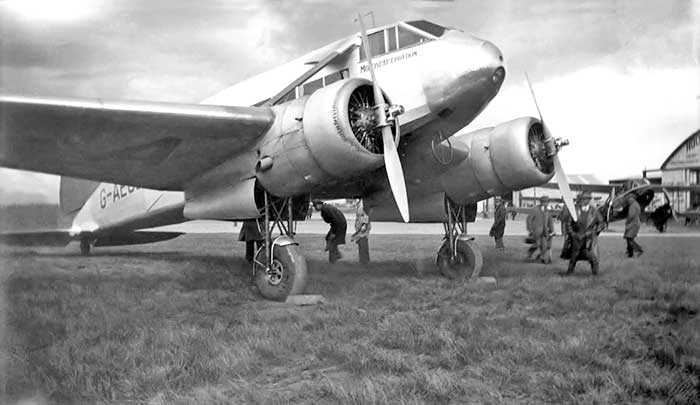
Civil Aviation Historical Society
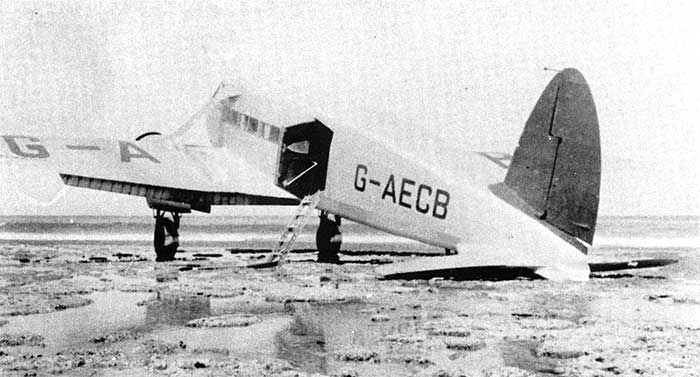
This remarkable photograph was taken by one of the crew when they abandoned the aircraft to seek help
from nearby native fishing boats. Keith R.Meggs collection
-Australian Civil Aircaft Register, Department of Civil Aviation and its successors
-DCA aircraft files, National Archives of Australia
-Civil Register pages, Aviation Historical Society of Australia
-British Civil Aircraft Register site: g-info
-Air Britain publications from 1961 details of VH-UTH in England
-Trove newspaper search/ National Library of Australia
- Flypast, A record of aviation in Australia, T.W.Boughton & N.M.Parnell, AGPS 1988
- Airlines and Aircraft of the Ansett group, Fred Niven: www.ansetthistory.info
- British Civil Aircraft Since 1919, A. J. Jackson, Putnam
- The Wandering Years, Arthur H. Affleck, Longmans 1964
- Virtue In Flying, The Keith Virtue story, Joan Priest,
- Forgotten Flyer, The Story of Charles W. Snook, Brian Hernan, Tangee Publishing 2007
- Peter Brown recalls - GAL Monospar ST12, Peter Brown, Rag & Tube magazine AAAA, December 1991
- General Aircraft Monspar ST-18 Croydon, Dave Eyre, AHSA Aviation Heritage, Vol. 19 No.4, June 1980
- Down on Seringapatam Reef, Bill Baker, AHSA Aviation Heritage, Vol 36 No.1, March 2005